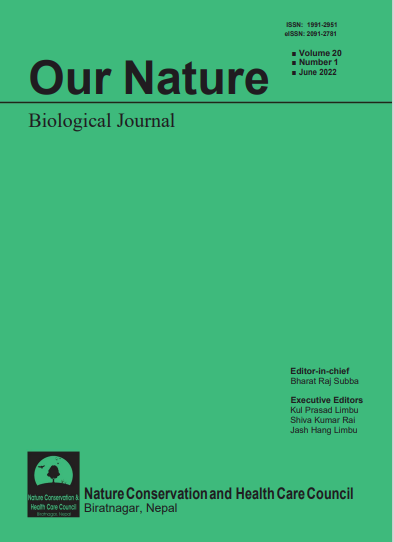Perception of transhumant herders on climate change and their adaptation strategies
DOI:
https://doi.org/10.3126/on.v20i1.43578Keywords:
Adaptation strategies, climate change, perception, resilience, transhumanceAbstract
Climate change is becoming one of the greatest challenges of our times questioning the survival of humanity and the coexistence of biodiversity. Its impact is realized globally in aspects of climate-induced disasters, water stresses, rangeland, agricultural, and food production. This case study confers the extent and impact of climate change on transhumant herders along with their coping strategies in Lho and Sirdibas of Chumnurbi Rural Municipality, Gorkha. Focus group discussion, key informant interview, and questionnaire survey were carried out in two wards covering herder's perception towards various climatic variability, impacts on transhumance system, and adaptation strategies undertaken for resilience. Data were analyzed using descriptive, inferential statistics and GIS such as percentage, frequency, weighted mean, index of relative ranking, Chi-square test, Normalized Difference Vegetation Index (NDVI), Normalized Difference Snow Index (NDSI), etc. were presented in figures and charts. This study showed that temperature is rising and precipitation is falling in the rural mountainous areas along with a decrease in snow cover and an increase in vegetation cover over a period of time. Seasonal movement of livestock is mainly guided by the search of forage resources and for adjusting the temperature. The impacts such as the decrease in pasture resources, increase in drought, decrease in agricultural production, etc. were perceived by the herders. Adaptation strategies such as the seasonal movement of livestock, diversification of income sources, and grazing resources were most noticed. Most of them were autonomous based on indigenous knowledge and innovation. The study recommends that the perceived changes and possible impacts of climate change to the transhumance systems need to be monitored scientifically over time. Further, more programs and policies should be developed for the resilience of the community.
Downloads
Downloads
Published
How to Cite
Issue
Section
License
Copyright (c) 2022 Mahesh Neupane, Rajeev Joshi, Dinesh Bhandari, Nripesh Awasthi

This work is licensed under a Creative Commons Attribution-NonCommercial 4.0 International License.
This license enables reusers to distribute, remix, adapt, and build upon the material in any medium or format for noncommercial purposes only, and only so long as attribution is given to the creator.




